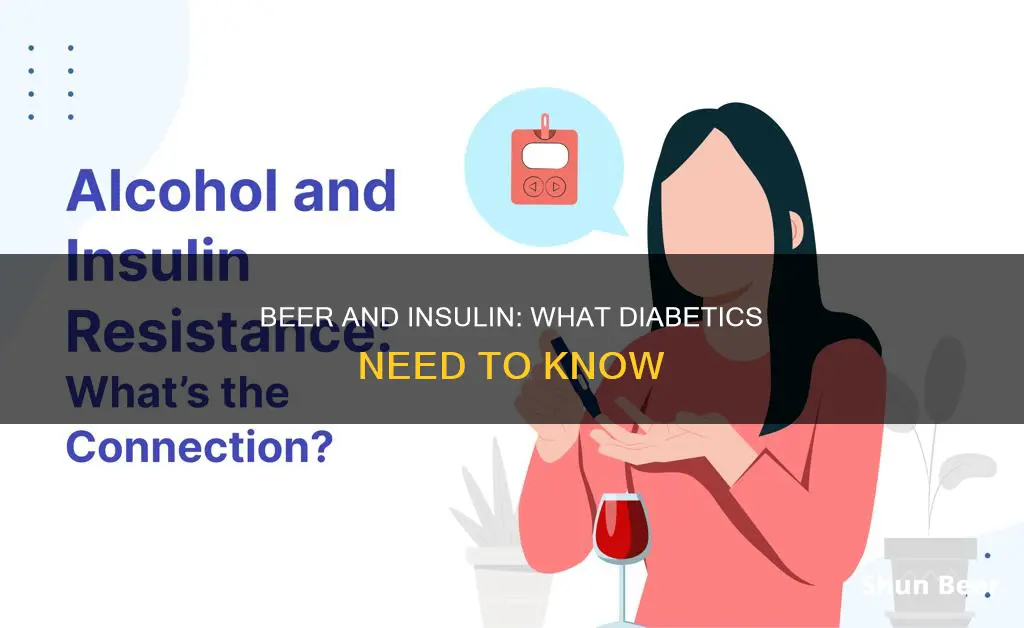
Whether you have type 1 or type 2 diabetes, you may wonder if it's safe to drink beer while taking insulin. The short answer is yes, but there are important considerations to keep in mind. Firstly, alcohol competes with your liver's ability to regulate blood sugar, so drinking can lead to dangerously low blood sugar (hypoglycemia) for up to 24 hours after consumption. This risk is heightened if you're taking insulin or other anti-hyperglycemic medications. Additionally, the symptoms of hypoglycemia can be similar to those of intoxication, so it's crucial to monitor your blood sugar levels and be mindful of your consumption. While drinking in moderation, it's recommended to never drink on an empty stomach, choose drinks wisely, and drink slowly.
| Characteristics | Values |
|---|---|
| Can people with diabetes drink beer? | Yes, but in moderation. |
| How does beer impact blood sugar levels? | Beer is a significant source of carbohydrates and can impact blood sugar. |
| What are the risks of drinking beer with diabetes? | Drinking beer may contribute to weight gain over time. Beer can also increase the risk of hypoglycemia, especially if you are taking diabetes medication. |
| Are there any benefits to drinking beer with diabetes? | Some studies suggest that light drinking may be beneficial for people with diabetes. |
| What are the recommendations for alcohol consumption for people with diabetes? | It is recommended that women have no more than one drink per day and men have no more than two drinks per day. |
| What are some safety guidelines for drinking with diabetes? | Never drink on an empty stomach, monitor blood sugar levels, choose drinks with lower sugar and carb content, and drink slowly. |
What You'll Learn

Beer impacts blood sugar levels
Beer can impact blood sugar levels in several ways. Firstly, beer is a significant source of carbohydrates, which can cause a rise in blood sugar levels. The exact amount of carbohydrates in beer varies depending on the type, but on average, a 12-ounce can of beer contains 13 grams of carbohydrates. This is nearly equivalent to one carb serving, which is defined as 15 grams of carbohydrates. Therefore, consuming beer can significantly affect blood sugar levels and must be treated accordingly.
Additionally, the liver is responsible for clearing alcohol from the body and releasing glucose into the bloodstream to maintain normal blood sugar levels. When a person consumes alcohol, the liver prioritizes breaking down and removing the alcohol, which delays the release of glucose. This can lead to a drop in blood sugar levels, a condition known as hypoglycemia. Hypoglycemia can be dangerous, and its symptoms, such as dizziness and loss of consciousness, can be similar to those of alcohol intoxication. Therefore, it is essential to monitor blood sugar levels before, during, and even up to 24 hours after drinking beer, especially for people with diabetes who take insulin or certain diabetes medications.
Furthermore, beer can be high in calories, depending on the type, which can contribute to weight gain over time. Excess weight can increase the risk of developing type 2 diabetes and worsen the condition. Alcohol consumption can also stimulate appetite, leading to overeating and further increasing blood sugar levels. Additionally, the calories from alcohol are stored in the liver as fat, which can make liver cells more insulin resistant and contribute to higher blood sugar levels over time.
It is important to note that the effects of beer on blood sugar levels can vary depending on the amount consumed and individual factors such as overall health and liver function. For people with diabetes, it is crucial to understand how alcohol influences their blood sugar levels and to consume beer in moderation, following the recommended guidelines of one drink per day for women and two drinks per day for men. Consulting with a healthcare provider is essential to determine what is safe and to understand the risks associated with drinking beer while taking insulin or managing diabetes.
Beer and G6PD Deficiency: What You Need to Know
You may want to see also

Alcohol can mask hypoglycemia symptoms
Alcohol can affect the body in several ways, and it is essential to understand the risks involved, especially for people with diabetes. Alcohol consumption can lead to hypoglycemia, or low blood sugar, which is dangerous and requires immediate medical attention.
When an individual consumes alcohol, the liver focuses on breaking it down instead of maintaining stable blood sugar levels. This is because the liver is responsible for both stabilising blood sugar and detoxifying the body of alcohol. As a result, the person may experience hypoglycemia.
The symptoms of hypoglycemia include dizziness, lightheadedness, and loss of consciousness in extreme cases. These symptoms are similar to those of drunkenness, making it challenging to determine whether a person is intoxicated or experiencing hypoglycemia. This situation is known as "hypoglycemia unawareness," and it is particularly common among people with type 1 diabetes who use insulin to control their blood glucose levels.
To manage this condition, it is recommended to eat a snack or a meal while drinking or immediately before drinking. Consuming carbohydrates ensures that there is some glucose in the system, reducing the risk of low blood sugar. Additionally, drinking alcohol on an empty stomach or when blood sugar levels are already low increases the likelihood of hypoglycemia. Therefore, it is advisable to avoid drinking on an empty stomach.
Furthermore, the effects of alcohol on blood sugar levels can last up to 24 hours after drinking. Hence, it is crucial to monitor blood sugar levels before, during, and after drinking alcohol. Staying within the recommended drinking limits, consuming alcohol with food, and choosing drinks with lower sugar and carb content can help mitigate the risks associated with alcohol consumption.
In summary, alcohol can mask hypoglycemia symptoms because the liver prioritises detoxifying the body of alcohol over maintaining stable blood sugar levels. This shift in the liver's function can lead to a delay in releasing necessary sugars into the bloodstream, resulting in hypoglycemia. To manage this risk, it is important to be mindful of alcohol consumption, especially for individuals with diabetes, and to take appropriate steps such as eating before or while drinking and closely monitoring blood sugar levels.
Champagne and Beer: Mixing Drinks, Safe or Not?
You may want to see also

Drinking guidelines for diabetics
If you have diabetes, drinking alcohol, including beer, is not completely off the table, but it does require careful consideration and moderation. Here are some guidelines to help you make informed decisions about drinking alcohol while managing your diabetes:
Understand the Risks
Alcohol can interfere with your blood sugar levels and increase the risk of hypoglycemia, especially if you are taking insulin or other medications for diabetes. Alcohol can also cloud your judgment, making it harder for you to recognise the symptoms of low blood sugar. Additionally, the symptoms of hypoglycemia can resemble those of intoxication, such as confusion and dizziness, which can lead to dangerous situations if not properly managed.
Know Your Limits
It is recommended that women limit their alcohol intake to no more than one drink per day, and men should not exceed two drinks per day. One drink is typically considered as 12 ounces of beer, 5 ounces of wine, or 1.5 ounces of distilled spirits. It is important to note that these are general guidelines, and you should always consult with your healthcare provider to determine what is safe for you based on your individual circumstances.
Never Drink on an Empty Stomach
Always consume alcohol with food or after a meal. Eating slows down the absorption of alcohol and helps raise blood sugar levels, reducing the risk of hypoglycemia. Avoid drinking excessively or on an empty stomach, as this can further increase the risk of low blood sugar.
Choose Your Drinks Wisely
Not all alcoholic beverages are created equal when it comes to diabetes. Opt for drinks that are lower in sugar and carbohydrates. Choose liquor mixed with club soda or water, dry wines, or low-carb beers. Avoid sugary mixers, sweet wines, or liquor mixed with sweetened soda or juice.
Monitor Your Blood Sugar Levels
Check your blood sugar levels before, during, and after drinking. Continue to monitor your levels for up to 24 hours after drinking, as alcohol can affect your blood sugar even after you stop consuming it. This will help you manage your diabetes effectively and prevent complications.
Wear a Medical Alert ID
Always wear a medical alert ID that states you have diabetes. This will ensure that you receive proper medical attention in case of an emergency, especially if you are unconscious or unable to communicate your condition.
Inform Others
Let the people you are drinking with know that you have diabetes. This way, they can recognise the signs of low blood sugar or intoxication and help you get the assistance you need if necessary.
Stay Hydrated
Remember to drink plenty of water along with your alcoholic beverages to stay hydrated. This will also help you avoid a hangover and manage your blood sugar levels.
Consult Your Healthcare Provider
Discuss your alcohol consumption with your healthcare provider. They can advise you on how drinking may affect your specific condition and any medications you are taking. They can also provide personalised guidelines and strategies to help you drink safely while managing your diabetes.
Beer and Meloxicam: Safe Mix or Health Risk?
You may want to see also

Alcohol and insulin do not interact directly
Excessive alcohol consumption can cause blood sugar levels to drop, increasing the risk of hypoglycemia for those with diabetes. This is because the liver, which is responsible for clearing alcohol from the body, also releases stored glucose into the bloodstream when the body needs energy. When alcohol is present, the liver focuses on metabolizing it first, potentially delaying the release of glucose and leading to low blood sugar.
Additionally, the symptoms of hypoglycemia, such as confusion, dizziness, and fatigue, can be similar to the symptoms of intoxication. This can make it challenging for individuals with diabetes to recognize when they need insulin, as they may attribute these symptoms to being inebriated.
To manage alcohol consumption while taking insulin, it is recommended to follow certain guidelines:
- Never drink on an empty stomach. Eating while consuming alcohol can slow absorption and raise blood sugar levels.
- Monitor blood sugar levels before and during drinking, and up to 24 hours afterward.
- Choose drinks wisely. Avoid sugary mixers, sweet wines, or liquor mixed with sweetened soda or juice. Opt for low-carb, low-alcohol, or "light" beverages instead.
- Drink slowly and in moderation. Space out drinks and alternate alcoholic beverages with water.
- Wear a medical alert ID and inform others around you about your diabetes, so they can recognize and respond to any potential hypoglycemic episodes.
Beer and Weight Gain: What's the Connection?
You may want to see also

Alcohol can affect weight
Additionally, alcohol can affect your organs, particularly the liver, which plays a crucial role in metabolizing fats, carbohydrates, and proteins. Excessive alcohol consumption can lead to alcoholic fatty liver, damaging the liver and affecting how your body metabolizes and stores carbohydrates and fats, making it more difficult to lose weight. Alcohol can also contribute to excess belly fat, as it is high in simple sugars, which are quickly stored as fat in the body, often accumulating in the abdominal area, leading to the "beer gut."
Alcohol also affects judgment and lowers inhibitions, making it harder to resist cravings for salty, greasy foods and leading to poor food choices. Furthermore, alcohol intake can disrupt sleep, causing increased periods of wakefulness during sleep cycles, which can lead to an imbalance in hormones related to hunger, satiety, and energy storage.
While the relationship between alcohol consumption and weight gain is complex and influenced by various factors, reducing alcohol intake may support weight loss by lowering calorie intake and improving organ function, particularly the liver's ability to metabolize fats and carbohydrates.
Beer Choices of the SEAL Team: What's Their Favorite Brew?
You may want to see also
Frequently asked questions
Yes, you can drink beer if you take insulin, but it's not without risks. It's important to know how to do so safely.
Drinking beer can affect your blood sugar levels and contribute to weight gain over time. Beer is a significant source of carbohydrates, and depending on the type, it can be high in calories and alcohol content. Additionally, drinking alcohol when taking insulin can increase the risk of hypoglycemia as the liver prioritises clearing alcohol from the body over releasing glucose into the bloodstream.
Here are some precautions to consider:
- Never drink on an empty stomach. It's recommended to eat while consuming alcohol to slow the absorption of alcohol and raise blood sugar levels.
- Test your blood sugar levels before drinking to ensure they aren't already low.
- Avoid sugary mixers, sweet wines, or liquor mixed with sweetened soda or juice. Opt for liquor mixed with club soda or water, dry wine, or low-carb beer.
- Drink slowly and in moderation.
- Wear a medical alert ID and inform those around you that you have diabetes.







